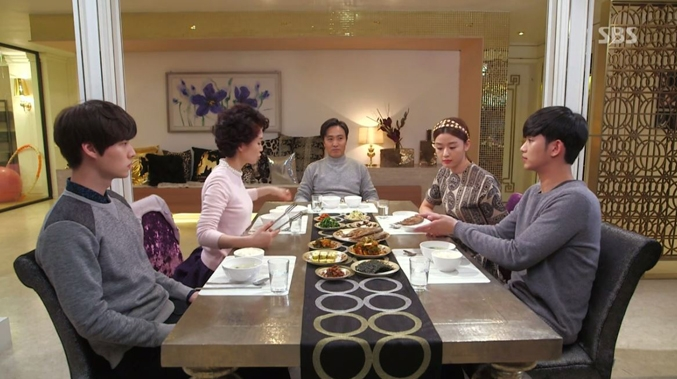This is a reprinting of a post I wrote for Dramabeans last year as part of their Food theme.
My mother nearly died three times this year.
That was a depressing start to this post, wasn’t it? I bet you thought the food theme would be fun!
The fact is, my Mum had a stroke three years ago and is severely physically and intellectually disabled. She has all her language and memories but the cognition of a child and she needs full-time assistance to do basic things like going to the toilet or showering. She can’t feed herself unsupervised and is regularly in danger of a second stroke or a heart attack. Earlier this year, she contracted cellulitis, which then turned into a systemic infection. In fact, as I’m typing this she’s still in hospital being treated for her third bout. And while she will be fine this time, she could be in this situation again next month or even as early as next week.
Last year, Dad was diagnosed with Stage 9 prostate cancer and had (successful) surgery. He’s now in remission but the cancer could recur at any time.
It’s probably not surprising that I have watched a lot of dramas in the past few years. I’ve had a lot of leave from work and have spent a lot of time in hospitals and at home. Possibly the worst part of family illness like this is the endless, almost-unendurable waiting. There’s nothing wrong with indulging in a bit of escapist fantasy and I have consumed dramas like the characters in them consume food.
And boy do they consume food.

While American shows tend to portray meals as a rushed necessity, a rare over-indulgence or an excessive symbol for privilege, in Korean dramas meals are about family, friendship and connection. And nothing symbolises that more than porridge.
Simple and nourishing, people make porridge for family or friends when they’re sick, unhappy or in need of comfort. They bring it to hospital beds or sick beds as a symbol of care. From Oh My Ghost to Healer and innumerable others, people make porridge more than any other meal as a way to cheer or support those they love. And while I’ve often had Asian friends joke that their families prefer to feed them than say they love them, there is no more simple expression of caring than cooking for somebody.

Like a lot of men of his era, my father does not cope if my mother is unwell. She did everything for him – and I mean everything. All the cooking, cleaning, and even scheduling of his social life. When she’s unwell, he doesn’t sleep or eat. He lives at the hospital and refuses to take care of himself. Every meal is a meal he should be eating with her. Every coffee is a coffee she can’t drink. If he enjoys himself, he feels guilt that she can’t experience that enjoyment.
The last three years have been an ongoing and exhausting battle to get him to see Mum’s condition as something to be managed within the context of a normal life. And that includes little things like making sure he eats breakfast rather than racing out the door to the hospital every morning.
Like a lot of Australians, I’ve spent quite a bit of time in south-east Asia over the years. And my Dad, former Australian Army, was once a liaison officer to the South Korean troops in a joint operation. He came out of it with a smattering of Korean, a tendency to add the word ‘Yo’ to sentences, a love of breakfast soup and an utter aversion to Soju, which he calls ‘white lightning’. So both he and I have eaten a lot of rice-based meals over the years and we prefer it to bread. Dad often says he misses having rice soup for breakfast, although he’d be happy if he never has to drink Soju again.
So porridge seemed like it was the perfect dish to make for my Dad while Mum was in hospital this year.

I looked online and found a recipe for Dakjuk and then realised my local supermarket carried kimchi. Luckily for us, the Intensive Care Unit kicked Dad out of the hospital at 8pm and wouldn’t let him back in till 8am. So I got up at 5am and spent the next two hours making Dakjuk from scratch. While various family members were rather bemused at me boiling a chicken that early in the morning, they nonetheless opted to try the porridge for breakfast as well.
Dad tried to head to the hospital as soon as it opened but I waylaid him with the promise of Korean rice porridge… and it worked. We sat outside on the deck as a family and ate it with kimchi. Dad loved it of course, eating two bowls and nearly all of the kimchi. But, to my surprise, my brothers also loved it and, since there were buckets of leftovers, they had it for breakfast the next two days as well.
The only unexpected problem was the kimchi. Having never tried it before, all my brothers nonetheless decided they loved it and kept complaining I hadn’t bought enough. I kept having to make supermarket trips for more kimchi and wished there was a nearby Asian grocer that sold it in bulk.
Last weekend, with Mum in hospital again my Dad asked me to fly up and make him porridge.
So I did.
But this time I bought enough kimchi.



